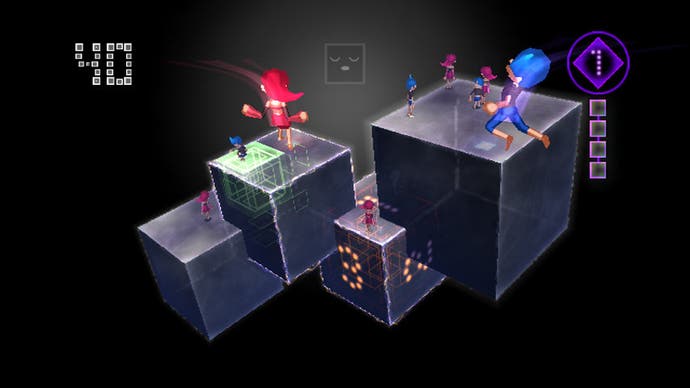You, Me and the Cubes
Balancing act.
Like all the best puzzle games, You, Me and the Cubes is built around a single, simple mechanism. There's a cube, obviously. Floating in space, all Rez-style glowing vector lines. You must keep it steady while flinging tiny people - dubbed Fallos - onto its upper surface.
Fallos can only be thrown in pairs, and you summon up a fresh duo by shaking the remote. Aim and click to set two landing spots, then throw with a familiar overarm bowling action. The Fallos hurl through the air, and the cube tilts and lurches based on their weight distribution. Any that slip to their death cost you five seconds from the timer, and since the game starts the clock at just 10 seconds for the final levels, there's little room for error. Once the required number of Fallos are balanced, you're judged for a three-second countdown, and provided nobody falls off, you're off to the next level.
When you've got to balance two Fallos on a single cube, it's very easy. Plop them in opposite corners - job done. Things soon get complicated, however. More cubes are added to the construction, and you must have at least one Fallo on each cube before the level can be finished. Since you can only throw Fallos in pairs, an odd number of cubes soon means that basic symmetry is impractical. Later still, the cubes start to take on different properties. Some will help your Fallos remain steady, others make it easier for them to topple to their doom.
And then there are the Pale Fallos. These eerie creatures are created randomly instead of normal Fallos, and will roam the cube surfaces, trying to disrupt your careful balancing. They can only be dislodged by throwing more Fallos at them, and they're only vulnerable to attack while celebrating after a successful assault on their kinfolk.

It's the beginnings of a genuinely interesting physics puzzler, but sadly the game never develops its ideas in any meaningful way. In any puzzle game there's usually a moment where the simplicity of the concept gives way to a multitude of subtle tactics that organically reveal themselves through play. Despite a few wrinkles, such as perfect throws bestowing sturdier Fallos, Cubes never reaches that point. It's simply too fussy, frantic and fiddly to build up the hypnotic rhythm or subliminal depth that makes stalwarts like Tetris so damnably addictive. As the playfield becomes more cluttered, it's increasingly difficult to keep tabs on all the Fallos in play, and the crude camera - rotating only in 45-degree chunks - leaves you frustratingly vulnerable to otherwise avoidable mistakes.
Too complex for casual immediacy, it also becomes too repetitive over its 36 multi-tiered levels. It's a lifespan that is rather too short for a genre that usually demands infinite replayability, but too long for something that reveals most of its tricks in the first few hours and then simply repeats and remixes them to diminishing effect. Stuck in limbo between simplicity and depth, it never quite satisfies either condition.
Visually, it's a bit of a muddle. The sparse vector aesthetic is mirrored in the stark 8-bit soundtrack, but that sits awkwardly with the crude Mii-style design of the Fallos. Split into blue-male and pink-female archetypes, they're quite endearing in a bland sort of way, scrambling to help toppling friends and so on, but they certainly don't have the sort of easy charm the game sorely needs.
That's not to say that the basic components aren't fun. There's a tangible joy in the Fallo-flinging action, and the moments when you have enough breathing room to contemplate and consider your next move are engaging and satisfying, if disappointingly rare. The two-player mode is also worth your time, tasking each player with throwing one Fallo each, and rewarding synchronised throws with greater stability. There's just too much space and not enough gameplay to fill it. A few more game modes would help to alleviate this tendency to peak too early - the concept is crying out for some sort of survival mode - but outside of the single-player level grid there's nothing else on offer.
At a lower price point, this underachieving might be tolerable, but for 1000 Nintendo Points we'd hope for something that had more than a good idea and abundant promise to its name. With a bit more time in the development incubator, You, Me and the Cubes could have been an essential purchase. As it stands, it's a compromised curiosity.

